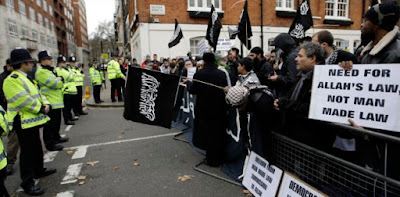- Get link
- X
- Other Apps
"Revealed: UK’s first official sharia courts," Abu Taher, Times Online
Islamic law has been officially adopted in Britain, with sharia courts given powers to rule on Muslim civil cases.
The government has quietly sanctioned the powers for sharia judges to rule on cases ranging from divorce and financial disputes to those involving domestic violence.
Rulings issued by a network of five sharia courts are enforceable with the full power of the judicial system, through the county courts or High Court.
Previously, the rulings of sharia courts in Britain could not be enforced, and depended on voluntary compliance among Muslims.
It has now emerged that sharia courts with these powers have been set up in London, Birmingham, Bradford and Manchester with the network’s headquarters in Nuneaton, Warwickshire. Two more courts are being planned for Glasgow and Edinburgh.
Sheikh Faiz-ul-Aqtab Siddiqi, whose Muslim Arbitration Tribunal runs the courts, said he had taken advantage of a clause in the Arbitration Act 1996.
Under the act, the sharia courts are classified as arbitration tribunals. The rulings of arbitration tribunals are binding in law, provided that both parties in the dispute agree to give it the power to rule on their case.
Siddiqi said: “We realised that under the Arbitration Act we can make rulings which can be enforced by county and high courts. The act allows disputes to be resolved using alternatives like tribunals. This method is called alternative dispute resolution, which for Muslims is what the sharia courts are.”
The disclosure that Muslim courts have legal powers in Britain comes seven months after Rowan Williams, the Archbishop of Canterbury, was pilloried for suggesting that the establishment of sharia in the future “seems unavoidable” in Britain.
In July, the head of the judiciary, the lord chief justice, Lord Phillips, further stoked controversy when he said that sharia could be used to settle marital and financial disputes.
In fact, Muslim tribunal courts started passing sharia judgments in August 2007. They have dealt with more than 100 cases that range from Muslim divorce and inheritance to nuisance neighbours.
It has also emerged that tribunal courts have settled six cases of domestic violence between married couples, working in tandem with the police investigations.
Siddiqi said he expected the courts to handle a greater number of “smaller” criminal cases in coming years as more Muslim clients approach them. “All we are doing is regulating community affairs in these cases,” said Siddiqi, chairman of the governing council of the tribunal.(more)
- Get link
- X
- Other Apps
You might also like:

